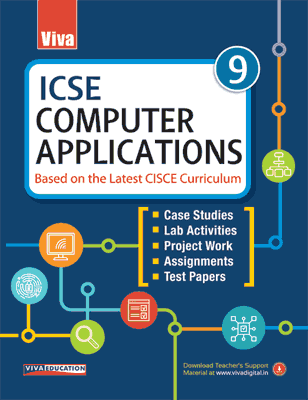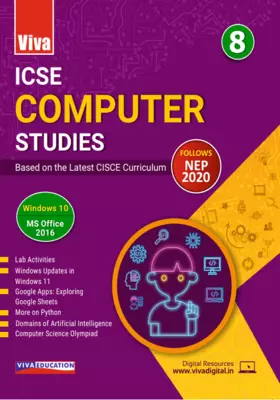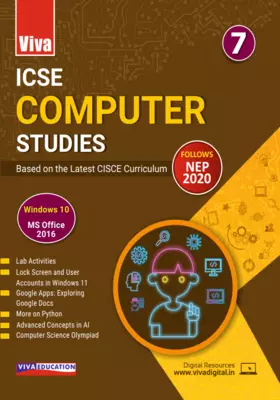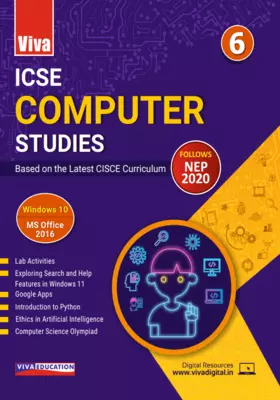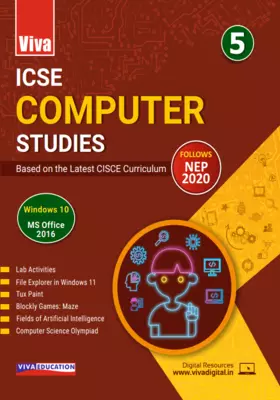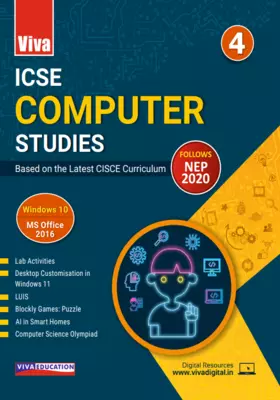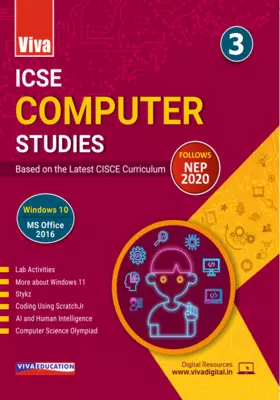VIVA ICSE Computer Applications, Class 9
VIVA ICSE Computer Applications, Class 9
Based on the Latest CISCE Curriculum
₹525.00
Go to cartISBN: 9789389662177
Bind: Paperback
Year: 2020
Pages: 236
Size: 8.5 x 11 Inch
Publisher: Viva Education
Exclusive Distributors: Viva Books
Sales Territory: Worldwide
• Case Studies
• Lab Activities
• Project Work
• Assignments
• Test Papers
ICSE Computer Applications is in two volumes for classes 9 and 10. This volume is specially meant for Class 9 strictly following the latest CISCE curriculum. The book covers the basic concepts of Java programming language. It is organised into ten chapters which include Introduction to Object-oriented Programming and Java, Elementary Concept of Objects and Classes, Values and Data Types, Operators in Java, Input in Java, Mathematical Library Methods, Conditional Constructs in Java, Iterative Constructs in Java, Nested for Loops and Computing Ethics. Each chapter of the book is organised into Learning Objectives, Case Study, Know More, Summary, Terms to Know, Review Questions (Solved), Application-based Questions, Activities and Projects, and Assignment. The book also provides two unsolved sample question papers at the end.
Features of Viva ICSE Computer Applications for Class 9
- Helps students to learn fundamental concepts of computer applications using object-oriented approach in Java programming language.
- Empowers students to build their own web-based applications.
- Develops logical and analytical thinking for solving real-life application problems using effective tools and programming methodologies.
- Makes students aware about the ethical issues involved while using computer and internet.
- Resources for Teachers • Teacher's Manual • Worksheets
Online Resources • Answer Key • Worksheets
Download Teacher's Support material at: www.vivadigital.in
Target Audience:
This book is useful for Class 9 strictly following the latest CISCE curriculum.
Contents:
Chapter 1. Introduction to Object-oriented Programming and Java • Approaches of Programming • Evolution of Programming Languages • Principles of Object-oriented Programming • Introduction to Java • Starting Java (BlueJ) • Creating BlueJ Project • Classes and Methods in Java • Java Applets and Applications • Java Compilation Process
Chapter 2. Elementary Concept of Objects and Classes • Objects and Classes • Modelling Entities and Their Behaviour • Class as an Object Factory • Method Calls between Objects • Attributes and Methods of Objects • Class as a User-defined Data Type
Chapter 3. Values and Data Types • Java Character Set • Tokens • Constants, Variables and Data Types • Primitive and Non-primitive Data Types • Type Conversions • Programs on Data Types and Type Conversions
Chapter 4. Operators in Java • Operators • Forms of Operators • Types of Operators • Prefix and Postfix Version of Operators • Hierarchy, Precedence and Associativity of Operators • New and Dot (.) Operators • Counters and Accumulators • Outputs with System.out.println() and System.out.print()
• System.out.println() versus System.out.print()
Chapter 5. Input in Java • Memory Allocation and Initialisation of Variables • Role of Parameters at the Time of Execution • Introduction to Packages • Obtaining Inputs • Types of Program Errors • Comments in Java
Chapter 6. Mathematical Library Methods • The Package java.lang (Default) • Basic Functions of Math Class • Mathematical Expressions in Java
Chapter 7. Conditional Constructs in Java • Types of Programming Constructs • Conditional Statements in Java • Role of Menu Driven Programs • Terminating the Program [System.exit(0)]
Chapter 8. Iterative Constructs in Java • Iteration (Looping) • Types of Iterative (Looping) Statements • The for Statement • The while Statement • The do...while Loop • Jump Statements • Interconversion between for, while and do...while Loops • Variations of Looping Statements • Role of Finite, Infinite, Empty and Time Delay Loops • Multiple Counter Variables
Chapter 9. Nested for Loops • Nested Loops • Break and Continue Statements in Nested Loops • Typical Programs on Nested Loops
Chapter 10. Computing Ethics • Ethical Issues in Computing • Intellectual Property Rights • Protection of Individual's Right to Privacy • Software Piracy • Cybercrimes and Their Types • Data Protection Methods on Internet • Good Etiquette and Ethical Practices
Sample Question Papers
Sample Question Papers 1
Sample Question Papers 2
About the Author:
Prof. Ashok Arora is a renowned author of over 100 books in Computer Science including Encyclopaedia on IT for Schools, Computer Fundamentals, Management Information Systems, Unix, C and C++. He has over 30 years of experience in software development, teaching and book writing. He is on the panel of various schools, universities and management institutes including Institute of Management Technology (IMT), All India Management Association (AIMA), Maharishi Dayanand University (MDU), Sikkim Manipal University (SMU) and FORE School of Management as a visiting faculty, courseware developer and examiner.
